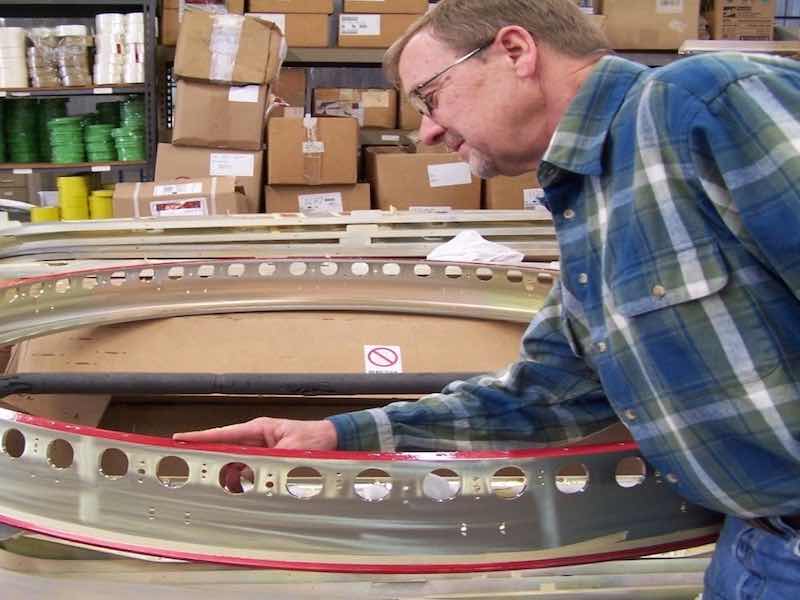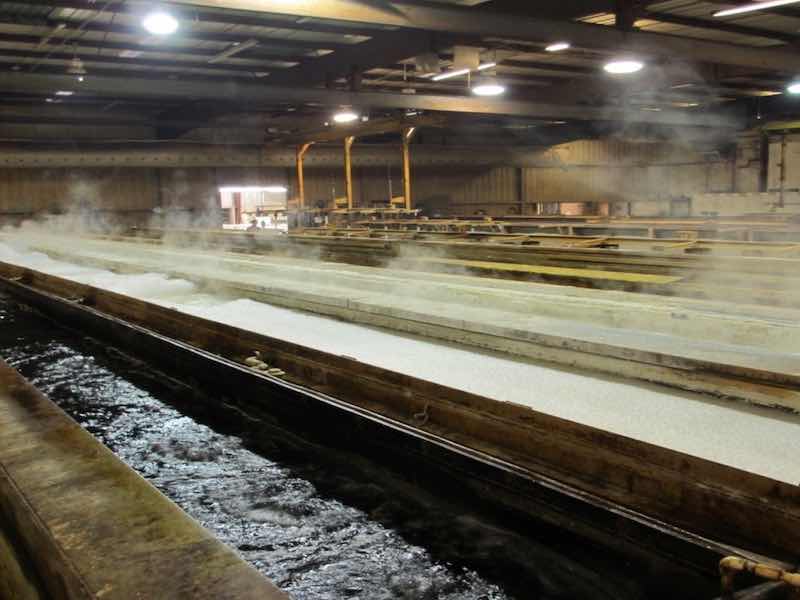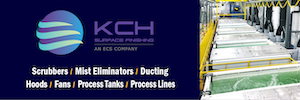As one of the largest family-owned aerospace processing operations in North America, Metal Finishing Co. President Robert Babst says he has no intention of selling his business.
 Rob Babst“I’m a glutton for punishment, I guess,” says the third-generation president of the Wichita, Kansas, company that has over 350 full-time employees and more than 500,000 square feet of process area.
Rob Babst“I’m a glutton for punishment, I guess,” says the third-generation president of the Wichita, Kansas, company that has over 350 full-time employees and more than 500,000 square feet of process area.
“I’ve watched a lot of our competition — and our customer base also on the machine shop side — sell to larger corporations,” Babst says. “We are doing well, and we really love what we’re doing, so there are no intentions to sell of any kind in the foreseeable future.”
Instead, Babst and his team are adding processes and expanding as the aerospace industry begins to ramp back up after a few years of decline. He says about 90% of their work is tied to the aerospace industry.
Two Locations in Kansas, One in Mexico
 MFC has over 350 full-time employees and more than 500,000 square feet of process area.MFC’s operations are one of the largest in North America, with two locations in Kansas and one in Chihuahua City in, Mexico. They offer over 100 aerospace finishing and pre-finish disciplines and hold hundreds of aerospace and commercial OEM processing approvals
MFC has over 350 full-time employees and more than 500,000 square feet of process area.MFC’s operations are one of the largest in North America, with two locations in Kansas and one in Chihuahua City in, Mexico. They offer over 100 aerospace finishing and pre-finish disciplines and hold hundreds of aerospace and commercial OEM processing approvals
“We hold more Boeing process approvals than any other processing company worldwide,” says Richard Smith, Vice President Of Operations. “We also hold 17 Nadcap accreditations companywide for chemical processing, non-destructive testing, heat treatment, and surface enhancement.”
To manage the millions of parts going through the seven separate buildings that are located on the three different plants, MFC has an in-house radio frequency identification (RFID) system to track orders through processing and to maintain traceability.
After a struggle in the aerospace industry for several years, MFC is bustling more than ever, along with many others in the industry, to keep up with demand.
“For us, we are seeing what seems like a fairly nice recovery in aerospace,” Babst says. “The general aviation market is really booming again. Gulfstream is doing very well, and Bombardier, Cessna, and Beechcraft products are all doing really well. That’s been a bright spot for us.”
‘Moving in the Right Direction’
 MFC’s operations are one of the largest in North America, with two locations in Kansas and this one in Chihuahua City in, Mexico. The commercial aviation side also has a nice recovery, he says, after the huge dip at the end of 2019 and through 2020 with the pandemic, but Babst says MFC is seeing a recovery on all fronts.
MFC’s operations are one of the largest in North America, with two locations in Kansas and this one in Chihuahua City in, Mexico. The commercial aviation side also has a nice recovery, he says, after the huge dip at the end of 2019 and through 2020 with the pandemic, but Babst says MFC is seeing a recovery on all fronts.
“It’s still moving in the right direction,” he says. “A little slower than we’d like, but it’s getting there.”
Babst became part of the MFC team in 2000, and his background and experience includecustomer service, engineering, processing, quality planning, and sales. He earned a Bachelor of Science in Chemical Engineering with the Highest Distinction from the University of Kansas and is also a Certified Electroplater Finisher.
Babst’s grandfather, Harley, founded MFC in 1940 in Wichita to provide surface finishing for the burgeoning aircraft and agricultural industries in the Midwest. When Harley passed away unexpectantly in 1967, his son — and Robert’s father — Bob quickly joined the company and assumed responsibility for the daily operations at just 19 years old.
When the 1970s proved to be a financial struggle for most companies like MFC, Bob decided to diversify away from a sole focus on conventional plating and surface finishing by adding a variety of related processes such as non-destructive testing, painting, shot peen, and flame spray coatings.
Creating Diversified Services Division
 It was during this time that MFC opened its Diversified Services processing facility in Wellington, Kansas, with the capability to perform processing on parts up to 80 feet in length. Bob served as president until 2007 when Robert took over the helm.
It was during this time that MFC opened its Diversified Services processing facility in Wellington, Kansas, with the capability to perform processing on parts up to 80 feet in length. Bob served as president until 2007 when Robert took over the helm.
With a clientele that includes Boeing, Cessna Aircraft, Spirit AeroSystems, Hawker Beechcraft, Raytheon, Sikorsky, and many others, the company is continuing the family legacy of growing MFC’s business not just nationally but also internationally.
“We are just finishing up adding about 10,000 square feet of new space we built for a painting,” Smith says. “It’s all brand-new equipment, and hopefully will improve our efficiencies even more.”
Aside from aerospace, MFC is going even further: they have a strong relationship with Blue Origin, an aerospace manufacturer that builds reusable launch vehicles and rocket engines and is owned by Amazon founder Jeff Bezos. In 2021, Blue Origin CEO Dr. Robert Smith visited the MFC facilities to see some of his parts being coated and prepared for one of their upcoming launches.
“It’s so important for us to be able to partner commercially with a wide supply base,” Smith said during the visit. “I came here for just one reason, and it’s to find out how many suppliers we can actually sign up in Wichita, to actually get more of what we need, because we have so much volume that’s coming with our new Shepherd, our engine production with our new Glen vehicle, and then, hopefully, going back to the moon.”
Babst says he was surprised when the Blue Origin CEO himself came to inspect their supply chain partners, which showed them just how concerned the company was in getting the right partners to help build their machinery.
“I thought it was really cool he came out to develop their supply chain in the Wichita area,” he says. “Usually, you don’t see that happen; you’ll get the supply chain folks but not the top management.”
45% Open Capacity Can Handle Growth
 Ed BallEd Ball, MFC’s Vice President of Sales and Marketing and its Director of Customer Relations, says working with companies like Blue Origin or SpaceX is something they want to do more of.
Ed BallEd Ball, MFC’s Vice President of Sales and Marketing and its Director of Customer Relations, says working with companies like Blue Origin or SpaceX is something they want to do more of.
“That portion of our business is pretty small compared to the business and commercial aircraft business,” he says. “But right now, it is growing, and we want to see it grow even more.”
MFC’s Smith says they have about 45% open capacity in their operations across all departments, but most of that is because they are struggling with finding enough labor to ramp up production. Currently, they are already working three shifts in all processes.
“We are struggling to get labor, but it’s picking up,” Smith says. “We’ve retained and acquired some really good employees to add to our family, and overall I think we are sitting in a good spot.
With two plants in Kansas (Wichita and Wellington) and one in Mexico, MFC has just about every processing capability needed in the finishing industry:
- Aluminum Processing: There are seven aluminum processing lines that can run chromic acid, boric/sulfuric acid, sulfuric acid, dyed sulfuric acid, and Type III hard anodize. The largest lines in Wichita are 20 feet long by 8 feet deep, and at the Wellington facility, they are 80 feet long by 54 inches deep.
- Plating and Coatings: Capabilities include zinc nickel, cadmium, Dow 7 and 17, hard chrome, nickel, electroless nickel, copper strike, silver strike, passivation, phosphate coatings, and phosphate fluoride, as well as support bake ovens and blasting services.
- Spray-On Coatings: MFC can apply primer, top-coat, and others such as Teflon, fuel cell, dry film lube, non-skid coating, and Sol-Gel are applied using one of the 37 spray booth stations. The additional 10,000-square-foot paint shop will be in service at the Mclean facility first quarter of 2023, adding eight more paint stations for a total of 45.
- Non-Destructive Testing: MFC has extensive NDT/NDI/MRO capabilities in metals, composites, and bonded assemblies, including penetrant inspection, magnetic particle inspection, ultrasonic inspection, X-ray, eddy current, phased array, weld inspection, and several others. They can also provide on-site NDT inspection.
- Heat Treatment: MFC is unique in aerospace processing plants by also performing heat treatment, which complements their other processes. They also provide support services, including straightening, aging, and testing of aluminum parts and wrought materials, as well as can perform heat treatment of titanium, alloys, carbon steel, stainless steel, and ph steel. quench, temper, normalizing, annealing, and carburizing. They utilize an in-house, fully equipped metallurgical lab.
- Other Service: polishing, shot peening (surface enhancement), thermal spray (tungsten carbide), commercial powder coating, and commercial electro-zinc plating.
Sophisticated RFID System to Tracks Orders
 Bob Babst CEO Metal Finishing Company, Dr. Bob Smith CEO Blue Origin, and Rob Babst President Metal Finishing Company touring the Murdock facility.Babst says it is difficult to integrate automation in many of their finishing processes because of the low volume, high mix of parts they deliver to the aerospace industry.
Bob Babst CEO Metal Finishing Company, Dr. Bob Smith CEO Blue Origin, and Rob Babst President Metal Finishing Company touring the Murdock facility.Babst says it is difficult to integrate automation in many of their finishing processes because of the low volume, high mix of parts they deliver to the aerospace industry.
“Automation is pretty tough for us as applied to process lines, but we look for opportunities there,” he says. “Where we have done more work in automating is in all the other touchpoints, especially the way we track orders in our shop and the way we communicate information to our customer base.”
The sophisticated RFID system throughout the shop tracks orders and enables MFC to report back quickly to their customers and to their own internal management team.
“We’ve put a lot of effort behind our technology here the past couple of years,” Babst says.
One of those ways is in the masking department, where MFC upgraded its technology to be able to create its own custom masks for the 1,000s of parts that call for unique treatments.
“We have a very large amount of masking compared to what we used to have,” Ball says. “We added three 3D printers to make our own masks, as we have purchased several plotters to also help customize them.”
Finding More Partners in the Aerospace Market
 MFC can apply primer, top-coat, and others such as Teflon, fuel cell, dry film lube, non-skid coating, and Sol-Gel are applied using one of the 37 spray booth stations. Ball says that when business slowed during the pandemic in 2020 through 2022, the MFC management team set out to find more partners they could work with within the aerospace market and came away with a significant new crop of customers.
MFC can apply primer, top-coat, and others such as Teflon, fuel cell, dry film lube, non-skid coating, and Sol-Gel are applied using one of the 37 spray booth stations. Ball says that when business slowed during the pandemic in 2020 through 2022, the MFC management team set out to find more partners they could work with within the aerospace market and came away with a significant new crop of customers.
“We spent a lot of time digging, and we’ve developed some relationships that we wouldn’t have been able to ferret out without having that time,” Ball says. “We used that spare time looking at other types of prospects. With the number of approvals we have and the capacity we have, we serve internationally on a regular basis, and we’re getting in orders on a daily basis from international partners.”
Being in the Midwest — and almost in the center of the U.S. — has given MFC an advantage, as some finishers in other parts of the country have struggled with handling capacity due to labor or regulatory issues. As those shops cut back on processes and services, Ball says many OEMs have reached out to MFC because of its large menu of processes.
“We have a pretty good size company coming in from Arizona because they said, ‘Hey, the processors are just dropping off in the Colorado, Arizona area, and in heat treatment, they’re just not being able to be supported,” Ball says. “Being in the Midwest gives us an opportunity to serve all directions. And Richard has made a real effort to make sure we have the things in place to be able to take on those new customers as well as take care of our core customers that have always been the ones that have supported.”
Employees Understand the Need for Consistent Quality
 Aside from the expansive space under the roof at three facilities, the dozens of processes, and the numerous approvals, Babst says the driving force behind MFC’s continued success has been how its employees understand the need for consistent quality.
Aside from the expansive space under the roof at three facilities, the dozens of processes, and the numerous approvals, Babst says the driving force behind MFC’s continued success has been how its employees understand the need for consistent quality.
“It’s really an emphasis on training throughout,” he says. “We do a very good job, and it’s something we’re always working on beefing up with some new software and some different ways to look at it.”
Especially on the non-destructive inspection side of the MFC business, Babst says keeping in-house “level three talent” is imperative.
“And then developing a lot of internal level twos and those type of certifications for all the NDT work we do, which is important, too,” he says. “It’s definitely woven throughout our organization.”











































